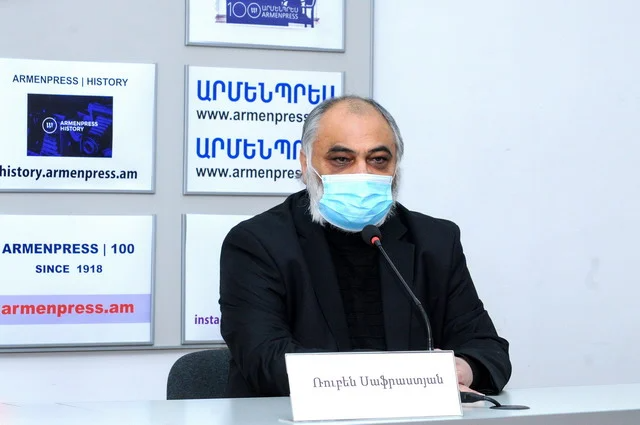“Ilham Aliyev’s statement reflects the Azerbaijani leader’s ambitions towards Armenia,” Ruben Safrastyan, an academic, Turkologist, and the acting head of the Armenian National Academy of Sciences Institute of Oriental Studies, said in the press hall of the Armenpress state news agency.
Ilham Aliyev had announced that Zangezur, Sevan, and Yerevan are historically Azerbaijani territory.
Ruben Safrastyan said that when the war first began, he had said that Azerbaijan’s and Turkey’s main goal was not only to attack and capture Artsakh and commit genocide against the Armenians of Artsakh, but also to weaken Armenia and continue their genocidal policies that the Young Turks adopted and continue Ataturk’s policies that Erdogan is trying to implement now by using Azerbaijan.
According to Ruben Safrastyan, Aliyev’s statements are the point of view of the official historiography of Azerbaijan, which has been spreading across Azerbaijan in every way possible in recent decades. He stated, “Azerbaijani children are raised in that spirit and the whole population is subjected to this false propaganda. When the head of state makes such a statement during a military parade, it speaks of an obvious expansionist, aggressive policy that is also announced in front of the whole world.”
Read also
Regarding the Turkish president’s speech, Ruben Safrastyan said, “The most important thing here is that he mentioned Enver Pasha, who was the main organizer and planner of the Armenian Genocide. His name was mentioned in Baku, which means that Erdogan is showing his people, supporters, Azerbaijanis, and the entire Turkic world that he fully intends to continue Enver’s pan-Turkic plans.”
According to the orientalist, Armenia needs to make a resolute counterattack against those statements using historical facts and revealing the essence, nature, and goals of the dangerous, expansionist, and aggressive policies of Azerbaijan and Turkey.
Ruben Safrastyan believes that Turkey was unable to reach its most important goal of deploying its peacekeeping forces along with Russian peacekeepers along the entire border of Artsakh, but Turkish influence over Azerbaijan drastically increased. Azerbaijan lost its independence in favor of Turkey. According to Ruben Safrastyan, the Russian side allowed Turkey to do the bare minimum and explained, “Aside from deploying peacekeeping troops, Turkey also did not reach its second goal- the deployment of Turkish militants as members of the joint Turkish-Russian monitoring center through which it could enter the territory of Artsakh. That also does not seem to be successful. The Russians were against it too. And the monitoring must be carried out by technical means from that very center. But, on the other hand, Turkey got the opportunity to be part of that monitoring center. That was the minimum that the Russians allowed them. This is important for Turkey because this was the first time in which they were given the right to carry out several operations regarding the military sector in the South Caucasus.”
According to Ruben Safrastyan, the big players in the world agreed to the thought that the South Caucasus is now under Russian influence. They also agreed to Turkey making some progress. “That has to do with the fact that Turkey is a member of NATO.”
Ruben Safrastyan believes that the Minsk Group is a format that Armenia can use to fill all the gaps and issues that became obvious with the trilateral agreement. “There are still many things that need to be confirmed, and perhaps it will be possible to fill those gaps with the help of the co-chairs. Of course, we need to mainly push forth the recognition of the right of self-determination of the people of Artsakh with the mediation of the Minsk Group co-chairs.”
Tatev Harutyunyan




















































